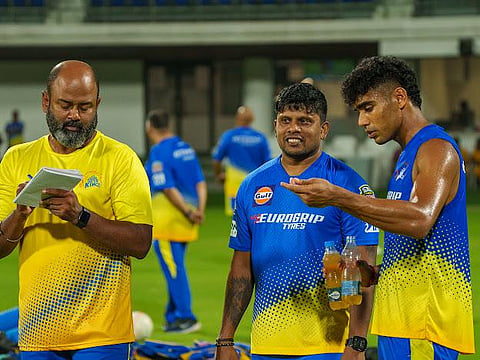

When Arun KR, a former track and field athlete and triple jump national medallist, decided to leave his government job in 2007 to pursue his dream of being associated with sports and coaching, it was not an easy decision.
Hailing from a family where sports had been ingrained in him from childhood, Arun wanted to do more in the field. Back then, however, it was a huge risk. He had been married by then and was responsible for taking care of the family. That is when his father and the family backed him to do something he was passionate about.
Arun left his job, joined a local fitness studio as a general manager in 2007. Eighteen years on, Arun is now the founder and Strength and Conditioning (S&C) coach at The Training Lab — an enterprise he started in 2016. That is not all, Arun is also the assistant S&C with five-time IPL champions Chennai Super Kings and the lead S&C coach with India Cements, taking care of their senior division teams.
The road to this point has been a long and arduous one, starting from taking a sabbatical to train up and coming athletes with Shankar Basu, a former India men’s S&C coach. Through these years, he worked with several athletes from the state, including Murali Vijay, Dinesh Karthik, Abhinav Mukund, B Indrajith, and Aparajith… the list goes on.
Initially, The Training Lab was a small space with four or five clients. Two years into his journey, Arun joined Kovai Kings in the Tamil Nadu Premier League. From thereon, there was no looking back. Stints with Dindigul Dragons, Take Solutions’ MRC-A in the first division, followed — where he worked with R Ashwin, before Arun was appointed as S&C for the TN state team. “I thought it was a big mistake. But then, now I have about 60-65 clients, no turning back. It’s been a fantastic journey and I’ve been able to do it all,” recalls Arun with a big smile, adding, “If I have to do everything again, I will do the same thing.”
Training manual
For someone who found joy in mentoring and working with young athletes, Arun believes being in S&C is more than just teaching. “It is a lot about personality and personal interaction; how you conduct yourself. Technical knowledge comes last. They have to be comfortable. They have to trust you. All this happens earlier. Even before you can impress them with the results. Then come the results,” he explains.
A thumb rule they have to follow while working with athletes is to try and keep them injury-free. “Nobody can assure anybody that I keep you injury-free. You can try to minimise the risk of injury. Whatever you do, on the field in the gym or the field in your training session, has to translate to the sport. When you put everything together and get the desired results they have in mind, that is when you are successful. When they come back to you and say this is what I have been feeling,” he says.
Arun believes personal training plans are easy because the results are pretty fast if they adhere to them. “Augmented feedback is really good. You have one session now, a speed session, you record their time, and two weeks later, they see an improvement. Whether it is about agility or linear speed, or endurance, they are sold. They know it works. Even if it is a shorter spell because cricketers are the most worked athletes in any sport because they play throughout the season. So if you are able to keep them injury-free during the season or minimising the chances of injury here and there, they can say okay. If they come back to you again and again, you know you have made a mark,” says Arun, an ACE and CSCS certified S&C coach.
Going forward
While he has extensively worked with cricketers, he has also worked with the Squash Rackets Federation of India. “I worked with Cyrus Poncha, the head coach of the Indian team, for two years. It was a good experience working with kids from 11 to 16 years,” says Arun.
After such feats, Arun now wants to work with multiple sports going forward, along with working in cricket at a higher capacity. “Cricket is a different sort of demand. When you play hockey or football, there’s a different demand. It keeps your mind sharp. You’re constantly studying, reading articles, research papers, (about) injuries, interacting with other coaches, and the demands of the game. I think there’s a lot of cross-learning happening. When you go across that, you become a better professional,” he explains.
With improving technology, too, there is a wide range of options for trainers to learn about and get out of their comfort zone. “Five years back, nobody spoke about VBT, velocity-based training, or force plates. Now, anything that comes out of the reading journal is available internationally. So, working with multiple fields definitely makes you a better practitioner. That’s where I want to see myself,” he signs off.